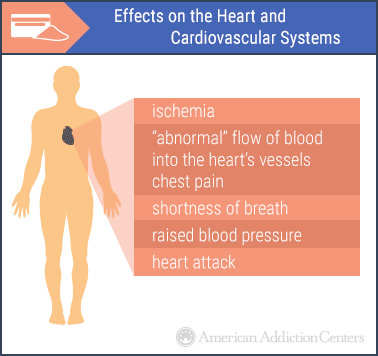
Other inhalants like nitrites can make your blood vessels larger and your heart beat faster. Effects of using Inhalants.

Another desired effect of inhalant abuse is the feeling that one does not have to deal with lifes problems.
How do inhalants affect the body. Inhalants starve the body of oxygen and force the heart to beat irregularly and more rapidly. Users can experience nausea and nosebleeds and lose their sense of hearing or smell. Chronic use can lead to muscle wasting and reduced muscle tone and the poisonous chemicals gradually damage the lungs and the immune system.
How do inhalants produce their effects. Most inhalants produce a rapid high that resembles alcohol intoxication with initial excitation then drowsiness disinhibition lightheadedness and agitation. Many brain systems may be involved in the anesthetic intoxicating and reinforcing effects of different inhalants.
Inhalants can change the way your brain talks to other parts of the body and may cause you to feel drunk or high. Many inhalants affect the brain in ways similar to depressants like tranquilizers sedatives or alcohol although the effects are usually shorter-lasting. Other inhalants like nitrites can make your blood vessels larger and your heart beat faster.
Nitrites are found in some room fragrances and. Here are just five of the problems that inhalants can cause. A weakened immune system.
This can make you more vulnerable to diseases. Your heart lungs liver and kidneys can be affected. When used over a long period of time inhalants can prevent your brain from getting enough oxygen.
All inhalants can shock the body and make the heart stop beating. Inhalant abuse is also associated with other long-term risks. Short-Term Effects of Inhalants.
Ways to use inhalants include sniffing snorting bagging or huffing. Within seconds of using an inhalant people feel excitement. They may be unable to stop smiling or laughing.
The substances also disrupt thinking. How Inhalants Affect the Body. Signs of Inhalant abuse.
Effects of using Inhalants. There are many negative effects to using inhalants. Here they are divided into two categories short term and long term.
The high from using inhalants only lasts a few minutes and afterward users can get depressed. Because of this many users inhale over. People who use inhalants breathe them in through the mouth huffing or nose.
Most inhalants affect the central nervous system and slow down brain activity. Short-term health effects include slurred or distorted speech lack of coordination euphoria feeling high dizziness and hallucinations. How Do Inhalants Produce Their Effects.
Scientists believe that most inhalants affect many different systems of the brain to produce their anesthetic intoxicating and reinforcing effects. Depending on the chemical being inhaled the effects can vary widelysome act as stimulants while others act as depressants. Another desired effect of inhalant abuse is the feeling that one does not have to deal with lifes problems.
The escape from responsibilities can be an enticing effect for a person who does not know how to address difficulties in his or her life. Prolonged abuse of inhalants can lead to effects similar to those of multiple sclerosis. Inhalants deprive the body of oxygen a condition known as hypoxia.
Hypoxia can damage cells throughout the body but the cells of the brain are especially sensitive to it. Someone who repeatedly uses inhalants may loose the ability to learn new things. If you abuse inhalants it can cause some long-term negative effects to your health.
These effects can include slurred speech dizziness lethargy drowsiness general muscle weakness stupor and depressed reflexes. Studies show that the inhalant toluene can cause euphoria headaches the inability to coordinate movements and giddy feelings. Similarly how do inhalants affect the body.
Inhalant use can cause damage to the heart kidneys brain liver bone marrow and other organsInhalants starve the body. Of oxygen and force the heart to beat irregularly and more rapidly. Users can experience nausea and nosebleeds and lose their sense of hearing or smell.
How Long-Term Inhalant Use Affects the Body. Because the liver and kidneys metabolize what the body ingests they can be damaged by toxic chemicals in inhalants. Solid particles called calculi can build up in the urine making it difficult or painful to urinate and you may also have an increased risk of.
There are many different kinds. Inhalants can change the way your brain talks to other parts of the body and may cause you to feel drunk or high. Many inhalants affect the brain in ways similar to depressants like tranquilizers sedatives or alcohol although the effects are usually shorter-lasting.
Other inhalants like nitrites can make your blood vessels larger and your. How do inhalants enter your body. Orally by smoking or eating it Through the nose by sniffing it taken from.
What do inhalants cause. Chronic inhalant abuse can lead. The chances of an overdose are increased if inhalants are taken with other depressant drugs such as alcohol benzodiazepines or opiates.
Using inhalants with other depressants can affect breathing rate and the heart and blood vessels. Mixing drugs can also increase the risk of passing out and suffocating or choking on vomit. Another aspect that impacts inhalants and how they affect the body is that these common substances are perfectly benign when used for their intended purposes.
No one would look twice at a can of spray paint or a bottle of weed killer but when misused these inhalants can cause brain damage debilitating seizures and even death. Likewise how do inhalants affect the heart. Inhalant use can cause damage to the heart kidneys brain liver bone marrow and other organs.
Inhalants starve the body of oxygen and force the heart to beat irregularly and more rapidly. Users can experience nausea and nosebleeds and lose their sense of hearing or smell.